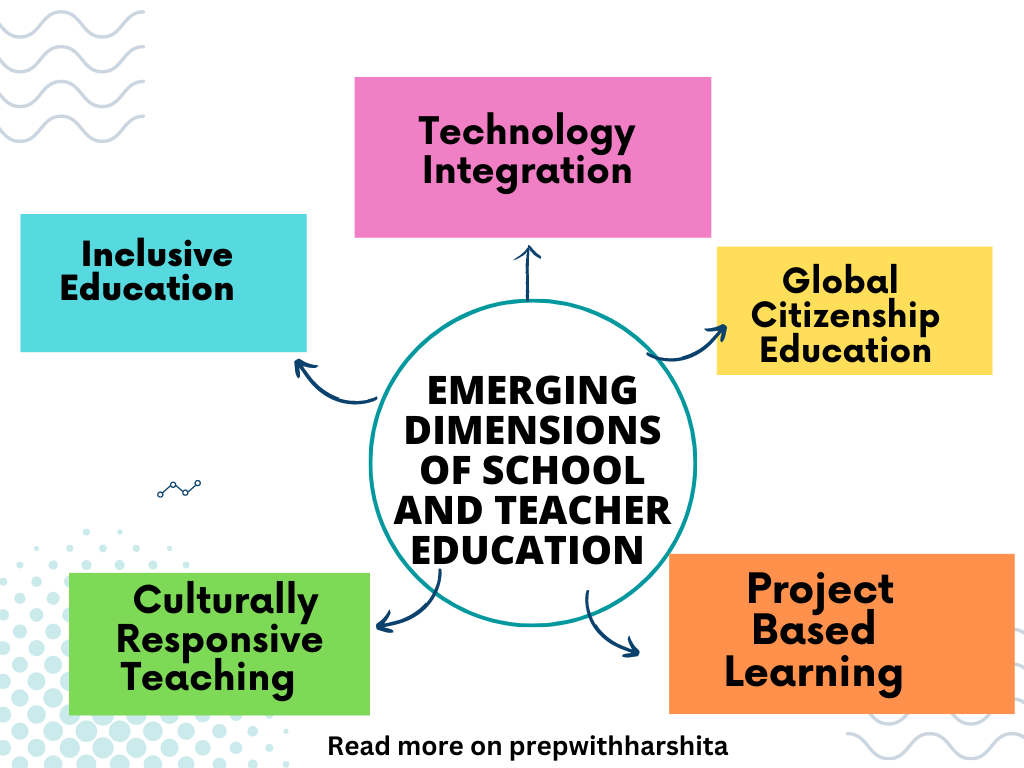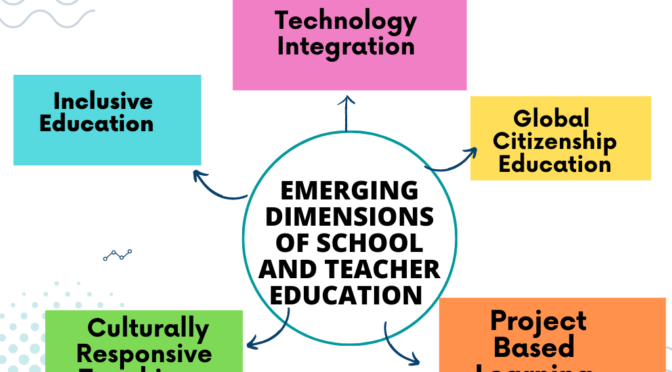Emerging dimensions of school and teacher education encompass new and evolving aspects that are shaping the field of education. These dimensions reflect the changing needs, challenges, and opportunities in contemporary educational contexts.
Here are some of the emerging dimensions in school and teacher education:
- Technology Integration: Technology integration is a significant dimension in modern education. It involves the use of digital tools, online platforms, educational software, and other technologies to enhance teaching and learning experiences. Teachers need to be proficient in leveraging technology to create engaging lessons, promote digital literacy, and facilitate remote or blended learning environments.
- Inclusive Education: Inclusive education focuses on creating learning environments that address the diverse needs of all students. It promotes access, participation, and success for students with disabilities, special needs, or diverse backgrounds. Teacher education programs are emphasizing strategies for differentiating instruction, supporting students with diverse learning styles, and fostering inclusive classrooms that celebrate diversity.
- Social and Emotional Learning (SEL): Social and emotional learning is gaining recognition as a crucial dimension of education. It involves developing students’ emotional intelligence, self-awareness, empathy, and interpersonal skills. Teacher education programs are incorporating SEL into their curriculum to equip educators with the knowledge and strategies to foster students’ social-emotional development and well-being.
- Culturally Responsive Teaching: Culturally responsive teaching recognizes and values students’ diverse cultural backgrounds, languages, and experiences. It involves incorporating students’ cultural references, perspectives, and identities into the curriculum and instructional practices. Teacher education programs are placing emphasis on developing cultural competence, dismantling biases, and equipping teachers to create inclusive and culturally responsive classrooms.
- Global Citizenship Education: Global citizenship education aims to develop students’ understanding of global issues, intercultural competence, and their role as responsible global citizens. It involves exploring concepts such as sustainability, human rights, social justice, and global interconnectedness. Teacher education programs are incorporating global perspectives into their curriculum, preparing teachers to promote global awareness and foster critical global thinking in students.
- Project-Based Learning: Project-based learning is an instructional approach that engages students in authentic, hands-on projects that address real-world problems or challenges. It promotes inquiry, critical thinking, collaboration, and problem-solving skills. Teacher education programs are integrating project-based learning methodologies, preparing teachers to design and facilitate meaningful project-based experiences for their students.
- Environmental Education and Sustainability: Environmental education emphasizes understanding ecological systems, sustainable practices, and environmental stewardship. It promotes awareness of environmental issues, conservation, and responsible citizenship. Teacher education programs are integrating environmental education into their curriculum, equipping teachers with the knowledge and skills to educate students about environmental sustainability.
- Critical Digital Literacy: Critical digital literacy involves developing students’ ability to critically navigate, evaluate, and create digital media and information. It focuses on digital citizenship, ethical use of technology, media literacy, and online safety. Teacher education programs are emphasizing the integration of critical digital literacy skills into the curriculum and preparing teachers to guide students in becoming responsible and discerning digital citizens.
These emerging dimensions reflect the evolving landscape of education and the need to address contemporary challenges and opportunities.
Schools and teacher education programs are adapting to these dimensions to equip educators with the knowledge, skills, and dispositions necessary to meet the diverse needs of students and foster meaningful and inclusive learning environments.
Also Read : School Education- Contemporary Issues

Also Visit: Prep with Harshita


The JetX slot machine is included in the top rating of virtual gambling slots. It is easy to find on the main menu or on request. It is successfully available to participate and win from smartphones, tablets, PCs, laptops. At first, you can try JetX demo. Pin Up is another Indian fantasy bookmaker that features the JetX casino game. The Indian casino and sportsbook has a live chat feature available for the JetX game. There are no bonus offers available for the JetX game on Pin Up casino. But, the bookmaker has a mobile app available for the players. Thus, punters can download the Pin Up casino app and play the JetX game. Also, Pin Up has a demo version available for this crash game. This gives them a chance to wager with virtual coins and learn the mechanics of the game. So, pin-up can be a popular option for JetX games in India.
https://bslkconsulting.com/crack-the-code-winning-big-with-low-volatility-strategy-in-spincity-aviator/
Paripesa has grown phenomenally not only in Nigeria but also in the entire African market. The site is known for putting customer satisfaction and safety first and is known for this all over the world. Apps for different operating systems are often very similar. In other words, if you’re searching for an Android app, the game will appear to be the same in the iPhone version. ᐉ Since JetX Rocket is a game of chance, no amount of mathematical tactics or strategies can improve your winning statistics. Only competent bankroll management, a responsible approach to financial betting and a bit of luck will help you stay in the black. What is a JetX double bet? It is an option to place 2 simultaneous bets in one round. It means numerous opportunities for managing risk levels, bet amounts and multipliers, using both auto and manual modes at the same time.